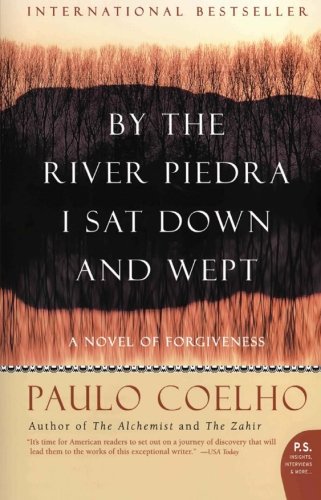All Nonfiction
- Bullying
- Books
- Academic
- Author Interviews
- Celebrity interviews
- College Articles
- College Essays
- Educator of the Year
- Heroes
- Interviews
- Memoir
- Personal Experience
- Sports
- Travel & Culture
All Opinions
- Bullying
- Current Events / Politics
- Discrimination
- Drugs / Alcohol / Smoking
- Entertainment / Celebrities
- Environment
- Love / Relationships
- Movies / Music / TV
- Pop Culture / Trends
- School / College
- Social Issues / Civics
- Spirituality / Religion
- Sports / Hobbies
All Hot Topics
- Bullying
- Community Service
- Environment
- Health
- Letters to the Editor
- Pride & Prejudice
- What Matters
- Back
Summer Guide
- Program Links
- Program Reviews
- Back
College Guide
- College Links
- College Reviews
- College Essays
- College Articles
- Back
By the River Piedra, I Sat Down and Wept by Paulo Coelho
Paulo Coelho, an award winning Brazilian author, wrote the novel By the River Piedra, I Sat Down and Wept in 1994 to personify the transformation of a simple girl to an enlightened women through his protagonist, Pilar. In By the River Piedra, I Sat Down and Wept, Pilar unknowingly embarks onto a spiritual journey in the French Pyrenees when she accepts an invitation to a lecture from her childhood sweetheart. She finds out that after eleven years of traveling, he has become a seminarian who teaches about the feminine side of God and can perform miracles. He states his love for her, and throughout the rest of Pilar’s journey, she battles with her inner conflicts regarding love. She finally accepts her heart’s desire to love and be loved; this transforms her from the materialistic girl she was to a broad-minded woman. Pilar lets go of her lover, and it seems they will never meet again until he finds her by the River Piedra and they reunite once again.
The most important incident throughout Pilar’s journey is when she performs the Exercise of the Other in Saint-Savin. Pilar, after a night of drinking with her childhood friend, allows herself to imagine the girl full of weakness and fear leave her body and become the Other. She realizes that the strength she tried to portray against love was only weakness, and the stubbornness behind it was only fear. By understanding that love is new and unique with each person, she is able to open her heart and fall once again for her friend. Paulo Coelho emphasizes, “[Pilar’s] heart once again began to speak” (70). This event is also crucial to Pilar’s transformation into a woman because she experiences happiness once again after many years of struggling through college, work, lousy love, and unnecessary worries.
Pilar begins her odyssey as an average girl who is studying in college in Zaragoza. She is planning to spend her “life behind a desk, helping judges dispose of their cases” (Coelho 25). She is constantly thinking about bus fares and hotel prices; Pilar worries about mundane problems such as money. Coelho illustrates that Pilar lives with “[. . .] a barricade of preconceived ideas, stubborn opinions, and textbooks” (73). She judges love through the filters of previous relationships and believes that love is a trap for the weak (33). But as Pilar progresses through her odyssey, she begins to change. After performing the Exercise of the Other and letting her heart (42) be won over by love, she transforms into a strong, liberated woman. She allows love to engulf her heart and free her of her materialistic worries. Coelho writes “[Pilar] was going to experience heaven and hell, joy and pain, dreams and hopelessness” (71). She resolves to no longer bury her emotions into the corners of her soul, like the girl she was, but instead experience them with a passion and fervor for life like the woman she has become.
By the end of Pilar’s journey, Pilar has fallen in love with her childhood love. He is a man who can perform “miracles” (Coelho 26) through the power of the Virgin Mary. Pilar states her love for him, which he is overjoyed to hear. By now the reader may have thought this to be Pilar’s happy ending, but may be surprised to discover Pilar’s lover asked the goddess to take away his gift (167) so that he could live an ordinary life. This breaks Pilar’s heart; all she can think of are “[. . .] the multitude of the sick who would die, the families that would suffer, the miracles that would never be performed, the smiles that would no longer grace the world [. . .]” (168). Pilar, full of grief, runs and falls asleep by the River Piedra. A woman from a covenant takes her in after Pilar almost died. To the reader, all of Pilar’s happiness seems to be gone, but are shocked to discover that her love comes back. He claims to have looked everywhere for her, and vows to love Pilar anywhere she goes and find his gift again. Overjoyed, they begin their path together once again, with love guiding their way.
Paulo Coelho writes By the River Piedra, I Sat Down and Wept to embody the transformation of girl into woman through Pilar, a woman who is faced with a journey that will teach her to open her heart. The event most critical to Pilar’s transformation is when she fulfills the Exercise of the Other, which allows her to end her journey with her love.
Similar Articles
JOIN THE DISCUSSION
This article has 0 comments.


(Article quotes book, cited in MLA format). I hope people will get a better sense of Pilar's journey from this.